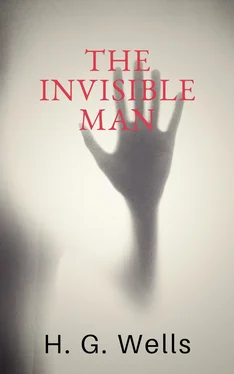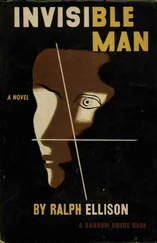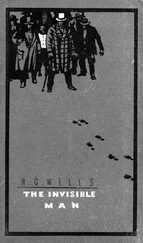"You brute, you!" said Fearenside, climbing off the waggon with his whip in his hand, while the dog watched him through the wheel. "Come here," said Fearenside—"You'd better."
Hall had stood gaping. "He wuz bit," said Hall. "I'd better go and see to en," and he trotted after the stranger. He met Mrs. Hall in the passage. "Carrier's darg," he said "bit en."
He went straight upstairs, and the stranger's door being ajar, he pushed it open and was entering without any ceremony, being of a naturally sympathetic turn of mind.
The blind was down and the room dim. He caught a glimpse of a most singular thing, what seemed a handless arm waving towards him, and a face of three huge indeterminate spots on white, very like the face of a pale pansy. Then he was struck violently in the chest, hurled back, and the door slammed in his face and locked. It was so rapid that it gave him no time to observe. A waving of indecipherable shapes, a blow, and a concussion. There he stood on the dark little landing, wondering what it might be that he had seen.
A couple of minutes after, he rejoined the little group that had formed outside the "Coach and Horses." There was Fearenside telling about it all over again for the second time; there was Mrs. Hall saying his dog didn't have no business to bite her guests; there was Huxter, the general dealer from over the road, interrogative; and Sandy Wadgers from the forge, judicial; besides women and children, all of them saying fatuities: "Wouldn't let en bite me, I knows"; "'Tasn't right have such dargs"; "Whad 'e bite 'n for, than?" and so forth.
Mr. Hall, staring at them from the steps and listening, found it incredible that he had seen anything so very remarkable happen upstairs. Besides, his vocabulary was altogether too limited to express his impressions.
"He don't want no help, he says," he said in answer to his wife's inquiry. "We'd better be a-takin' of his luggage in."
"He ought to have it cauterised at once," said Mr. Huxter; "especially if it's at all inflamed."
"I'd shoot en, that's what I'd do," said a lady in the group.
Suddenly the dog began growling again.
"Come along," cried an angry voice in the doorway, and there stood the muffled stranger with his collar turned up, and his hat-brim bent down. "The sooner you get those things in the better I'll be pleased." It is stated by an anonymous bystander that his trousers and gloves had been changed.
"Was you hurt, sir?" said Fearenside. "I'm rare sorry the darg—"
"Not a bit," said the stranger. "Never broke the skin. Hurry up with those things."
He then swore to himself, so Mr. Hall asserts.
Directly the first crate was, in accordance with his directions, carried into the parlour, the stranger flung himself upon it with extraordinary eagerness, and began to unpack it, scattering the straw with an utter disregard of Mrs. Hall's carpet. And from it he began to produce bottles—little fat bottles containing powders, small and slender bottles containing coloured and white fluids, fluted blue bottles labeled Poison, bottles with round bodies and slender necks, large green-glass bottles, large white-glass bottles, bottles with glass stoppers and frosted labels, bottles with fine corks, bottles with bungs, bottles with wooden caps, wine bottles, salad-oil bottles—putting them in rows on the chiffonnier, on the mantel, on the table under the window, round the floor, on the bookshelf—everywhere. The chemist's shop in Bramblehurst could not boast half so many. Quite a sight it was. Crate after crate yielded bottles, until all six were empty and the table high with straw; the only things that came out of these crates besides the bottles were a number of test-tubes and a carefully packed balance.
And directly the crates were unpacked, the stranger went to the window and set to work, not troubling in the least about the litter of straw, the fire which had gone out, the box of books outside, nor for the trunks and other luggage that had gone upstairs.
When Mrs. Hall took his dinner in to him, he was already so absorbed in his work, pouring little drops out of the bottles into test-tubes, that he did not hear her until she had swept away the bulk of the straw and put the tray on the table, with some little emphasis perhaps, seeing the state that the floor was in. Then he half turned his head and immediately turned it away again. But she saw he had removed his glasses; they were beside him on the table, and it seemed to her that his eye sockets were extraordinarily hollow. He put on his spectacles again, and then turned and faced her. She was about to complain of the straw on the floor when he anticipated her.
"I wish you wouldn't come in without knocking," he said in the tone of abnormal exasperation that seemed so characteristic of him.
"I knocked, but seemingly—"
"Perhaps you did. But in my investigations—my really very urgent and necessary investigations—the slightest disturbance, the jar of a door—I must ask you—"
"Certainly, sir. You can turn the lock if you're like that, you know. Any time."
"A very good idea," said the stranger.
"This stror, sir, if I might make so bold as to remark—"
"Don't. If the straw makes trouble put it down in the bill." And he mumbled at her—words suspiciously like curses.
He was so odd, standing there, so aggressive and explosive, bottle in one hand and test-tube in the other, that Mrs. Hall was quite alarmed. But she was a resolute woman. "In which case, I should like to know, sir, what you consider—"
"A shilling—put down a shilling. Surely a shilling's enough?"
"So be it," said Mrs. Hall, taking up the table-cloth and beginning to spread it over the table. "If you're satisfied, of course—"
He turned and sat down, with his coat-collar toward her.
All the afternoon he worked with the door locked and, as Mrs. Hall testifies, for the most part in silence. But once there was a concussion and a sound of bottles ringing together as though the table had been hit, and the smash of a bottle flung violently down, and then a rapid pacing athwart the room. Fearing "something was the matter," she went to the door and listened, not caring to knock.
"I can't go on," he was raving. "I can't go on. Three hundred thousand, four hundred thousand! The huge multitude! Cheated! All my life it may take me! … Patience! Patience indeed! … Fool! fool!"
There was a noise of hobnails on the bricks in the bar, and Mrs. Hall had very reluctantly to leave the rest of his soliloquy. When she returned the room was silent again, save for the faint crepitation of his chair and the occasional clink of a bottle. It was all over; the stranger had resumed work.
When she took in his tea she saw broken glass in the corner of the room under the concave mirror, and a golden stain that had been carelessly wiped. She called attention to it.
"Put it down in the bill," snapped her visitor. "For God's sake don't worry me. If there's damage done, put it down in the bill," and he went on ticking a list in the exercise book before him.
"I'll tell you something," said Fearenside, mysteriously. It was late in the afternoon, and they were in the little beer-shop of Iping Hanger.
"Well?" said Teddy Henfrey.
"This chap you're speaking of, what my dog bit. Well—he's black. Leastways, his legs are. I seed through the tear of his trousers and the tear of his glove. You'd have expected a sort of pinky to show, wouldn't you? Well—there wasn't none. Just blackness. I tell you, he's as black as my hat."
"My sakes!" said Henfrey. "It's a rummy case altogether. Why, his nose is as pink as paint!"
"That's true," said Fearenside. "I knows that. And I tell 'ee what I'm thinking. That marn's a piebald, Teddy. Black here and white there—in patches. And he's ashamed of it. He's a kind of half-breed, and the colour's come off patchy instead of mixing. I've heard of such things before. And it's the common way with horses, as any one can see."
Читать дальше












